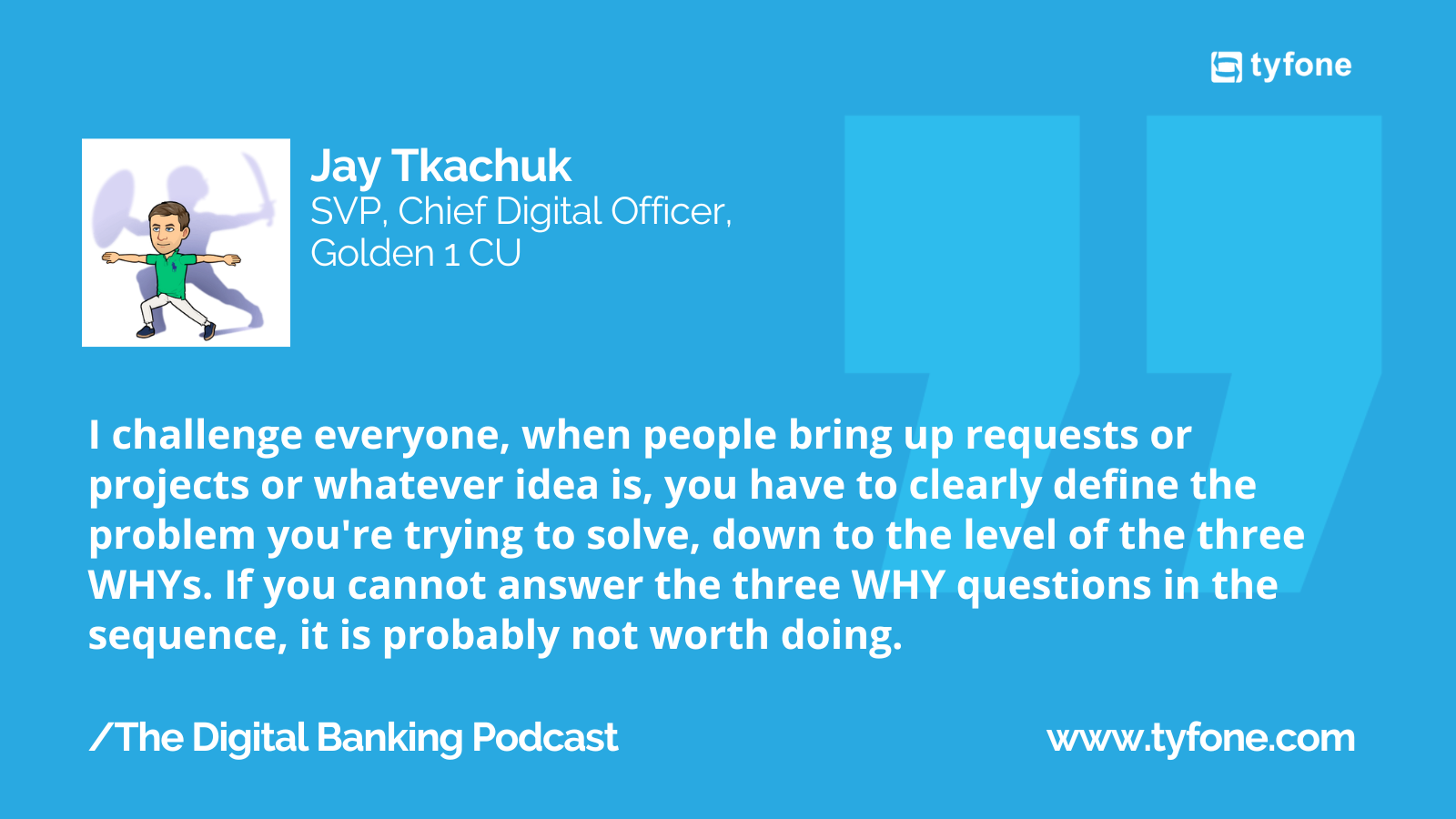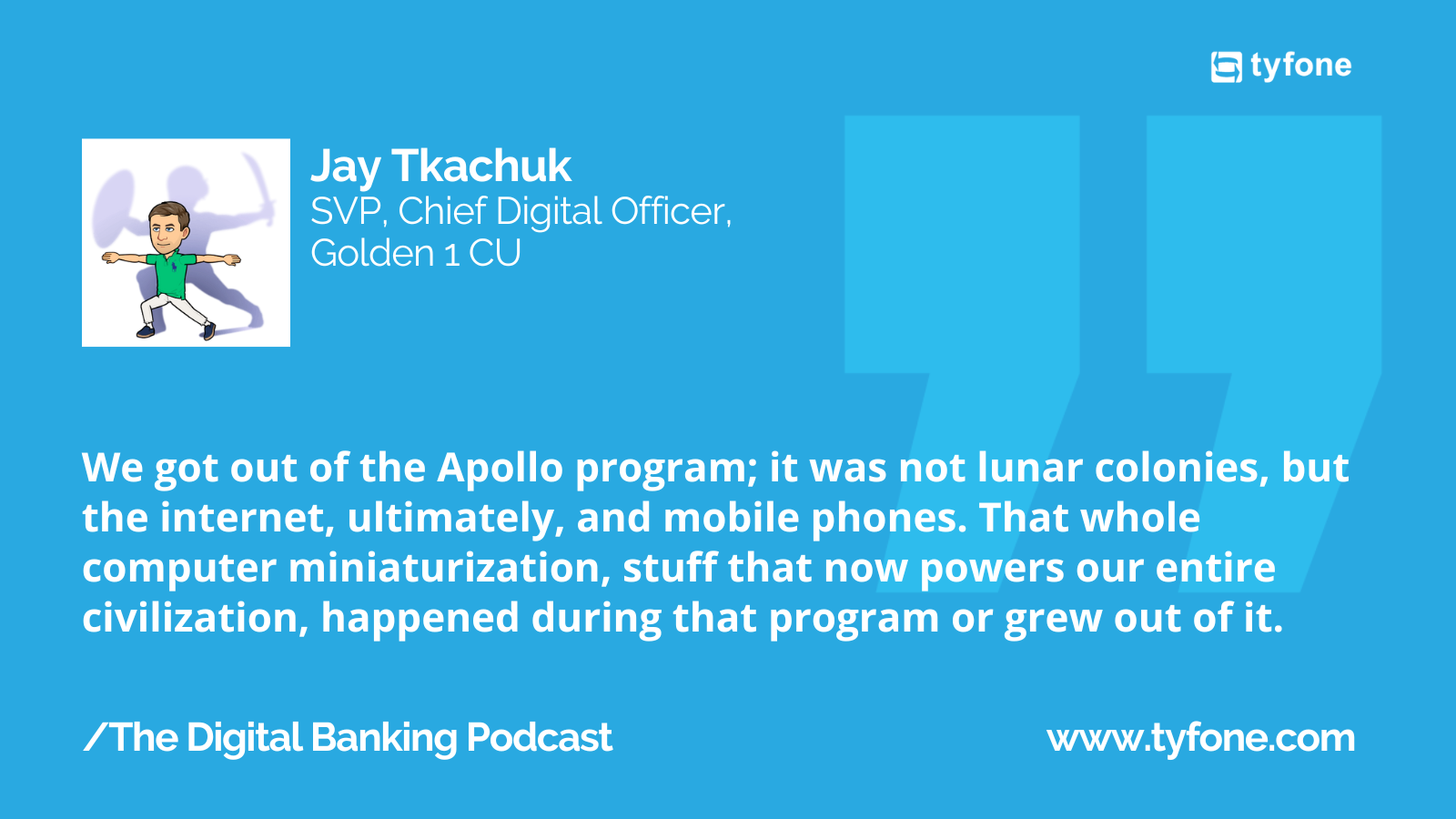The Importance of Having a Bold Goal and Clear Mission – Jay Tkachuk
- You can achieve amazing things if you have a very audacious, bold goal and coherent vision to motivate your team and push your team to get there.
- Digital transformation is as much about cultural change as it is about technological change. It must come from the top down and from the inside out.
- Data is every financial institution’s competitive differentiator. No other organization possesses the same data as your FI. You need to guard that data well and use it wisely.

Financial technology used to be a game of “keeping up with the Jones.’” In today’s environment, where digital transformation is imperative, financial institutions must look at every technology decision more strategically. You can’t just add shiny, new things to your tech stack; you must deploy each new technology with a clear purpose, in a manner that allows you to differentiate your brand.
According to Jay Tkachuk, the SVP and Chief Digital Officer at Golden 1 Credit Union, digital transformation requires a change in how the employer does business, and also in how decisions are made, and how people communicate with each other.
“Using the data to inform decisions, not just produce reports, but actually drive the decision making; when you know that after A comes to B and after B comes to C because of these things,” explained Tkachuk. “Understanding the logic of it all, retaining the lessons learned. Knowledge management is extremely important, especially now in this very fluid employment market when people don’t stick around often for longer than just a few years. Capturing that brilliance and recording the reasons why decisions were made and how a particular model was set up is paramount because otherwise, you’re just starting all over again every three years, and that’s not sustainable.

Be Like Water in Culture Change
“You have to transform the backbone, the technical, architectural backbone of the company because, inevitably, the way that your architecture looks affects everything else downstream, including culture,” noted Tkachuk. “If you have this monolithic architecture that takes years to deploy anything, your entire culture, no matter where they are – accounting, finance, call center – is going to reflect that. At the same time, you basically have to do those things in parallel. You have to change the underlying foundation to be more flexible and dynamic as you change the culture.”
He added that cultural change is a gradual process, so his motto is “boil a frog and not the ocean.” He suggested finding the frog, a particular one you have to tackle today, and dealing with that. “Be like water, as Bruce Lee once said. Be like water and be persistent and consistent, and keep pushing forward in the pace that ultimately erodes the rock and opens those new channels for you to go through,” Tkachuk concluded.
Stressful Events Motivate People to Evolve
Tkachuk noted that as a species, we only evolve during times of stress, and that’s when our creativity and flexibility of mind come into play. he claimed that the pandemic, for example, profoundly changed our society in a way that will be quite beneficial long term.
“A lot more people became aware of how microbiology works,” noted Tkachuk. “Right now, it’s probably too early, but the microbiology field is going to flourish after this. So we will learn a lot of new things, even with the human body. In the last few years, we thought we knew everything about our own anatomy, and apparently, we have been discovering whole new parts of what makes us, from brain membranes to this connective tissue that covers our bodies. All this stuff is fascinating, and it was pushed forward by something like a pandemic.”
Community FIs Should Be Relevant at the Time of Need of the Member
According to Tkachuk, it is crucial for community FIs to understand what their accountholders look like, understand their needs, and be relevant when those needs arise.
“You have to actually meet them and understand who they are, what natural segments they fall into in terms of needs that they have, how they bank, what kind of gaps they have,” explained Tkachuk. “You just have to understand your consumers in context. You can use modern technologies like AI to analyze your entire database and understand what natural segments exist within it, but after that, you have to go out and meet these people. You have to understand, again, who they are, how they bank, what products they use, why they use those products, what gaps they have, and ultimately give them what they need and not what they want.”
He adds that to be relevant in a time of need, you have to understand what that need is and be able to predict when that time will be. So, you can prepare for it.
“The only way to do that is to gain a profound understanding of your membership down to micro-segmentation of saying, ‘These people, of this particular age range and particular technographic, demographic and geographic areas, have this particular needs.’ So, today, let’s say they’re college students, and they have this set of needs, but a year from now, they’ll be young professionals, and they’ll start looking for their first cars and first houses. And three years from now or five years from now, they’re going to get married, and they’re going to, etc. You have to understand that entire evolution, at least be able to predict enough of it based on what the information you have. Again, you have to be able to learn from your lessons and tweak things as you deploy them. It is impossible to do that across the scale of something like Golden 1. I would say it’s impossible to do it, even on a much smaller scale, for smaller credit unions. You have to pick something and focus on that,” says Jay.

